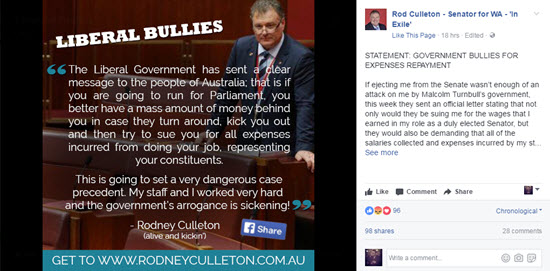
From the Crikey grapevine, the latest tips and rumours …
Robo-debt notices peaked in November. Data not previously released on the number of debt notices sent out to people who had been receiving welfare this week revealed just how much the Department of Human Services scaled back its Centrelink robo-debt notice distribution over summer, while headlines raged about the accuracy of the program.
There were just 230 notices in July last year, 844 in August, before suddenly ramping up to 62,240 in September, and peaking in November at 94,754, before dropping down to 8993 in December and 3465 in January. The department had previously said it would be slowing down over the Christmas period, and it expected to resume inundating people with notices this year. The government has so far resisted pressure from the opposition to stop sending out the notices while questions remain over the accuracy of the debt notice scheme. The parliamentary inquiry into the controversial scheme will hold its next hearing in Canberra tomorrow.
Copper sweet. Expect to see media reporting over the next few days that NBN Co. has bought 15,000 kilometres worth of copper for the Coalition’s version of the NBN. The figure came in response to a question on notice from the last round of estimates hearings. The opposition is likely to make this about replacing the decaying old Telstra copper lines, and that is probably quite true to a point, but, as Crikey previously reported, much of it is because of how the fibre-to-the-node (FttN) design is made that means extra copper is needed to connect to the nodes themselves. It is not unexpected; NBN Co. had previously said that the 1800km of copper in 2015 was just for the first six months of the FttN rollout, and it has ramped up significantly since then.
Still, if 1800km of copper cost $14 million, 15,000km must be pretty expensive, considering NBN had previously had difficulty sourcing copper. According to the company, it has sourced the copper from Australia, Turkey, and Brazil. Opposition spokesperson for communications Michelle Rowland has pointed out that 15,000km is longer than Highway 1 across Australia.
You can’t ask that. Appearing on FM radio can be a dangerous task for politicians, and this morning PM Malcolm Turnbull got thrown a question we’re not quite sure he understood. On Brisbane’s 97.3 this morning, host Bianca Dye asked Turnbull “do you ever Netflix and chill with Lucy?” to which the PM answered in the affirmative.
As a verb, to “Netflix and chill” does not merely refer to a night on the couch in front of House of Cards. To be asked if you wish to “Netflix and chill” carries the same euphemistic quality as would once have been attached to asking a date if they cared to come up for a coffee at the end of the evening.
It’s the same station where last year Turnbull recounted the story of how, when faced with an Anglican priest who refused to marry them, he offered a veiled threat of pre-marital “fornication”.
Verily, I Privy. The former One Nation senator-who-wasn’t has had another blow today, with the revelation that the Finance Department has written to him requiring that he pay back his $200,000-a-year salary, plus staff costs and other expenses he incurred while he was never actually a senator, following the High Court ruling that he had never been eligible to run for election. Culleton has proven himself decidedly sceptical about the authority of Australian courts, but one body he does retain his faith in is the Privy Council of the United Kingdom. In statement issued yesterday, Culleton said he was in the “process of compiling a submission” to the Queen’s advisory body.
Culleton will not be delighted to find that the Australia Act 1985 has all but closed that option off. The act, which was enacted to bring “constitutional arrangements affecting the Commonwealth and the States into conformity with the status of the Commonwealth of Australia as a sovereign, independent and federal nation,” formally terminated the power of the UK Parliament to legislate for Australia, and revoked any responsibility the UK government had in relation to state matters. Section 11, “Termination of appeals to Her Majesty in Council” all but removed the ability of Australian citizens to appeal state court decisions to the council (previous acts had already done that at a federal level).
*Heard anything that might interest Crikey? Send your tips to boss@crikey.com.au or use our guaranteed anonymous form








The Culleton pay-back on those grounds?
What about the legislation he passed?